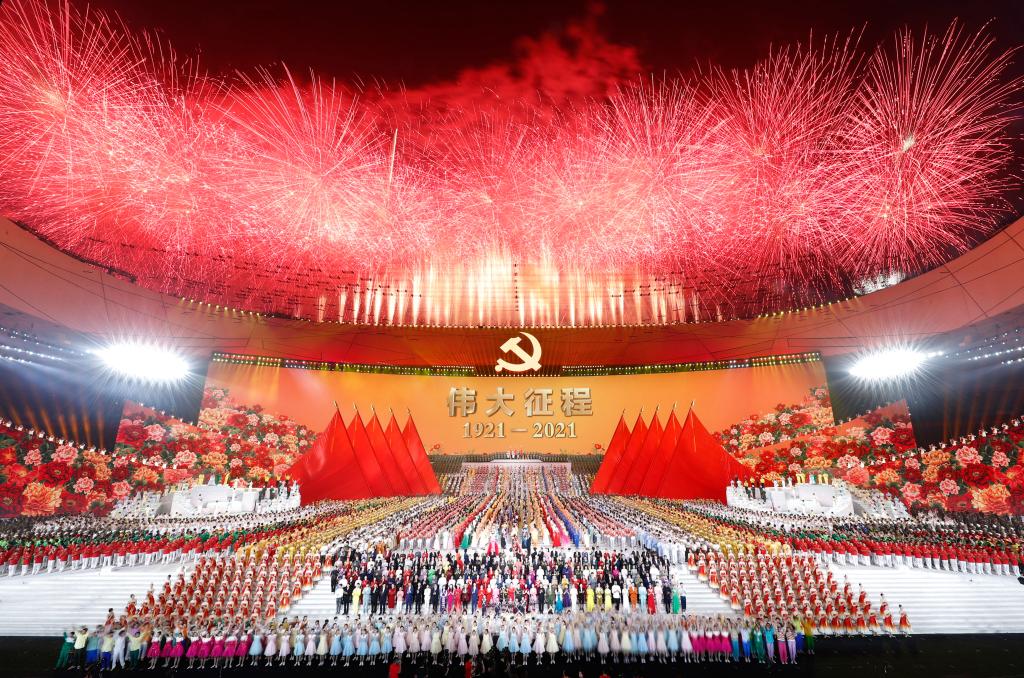One hundred years of the CPC
- By Robert Griffiths
 0 Comment(s)
0 Comment(s) Print
Print E-mail China.org.cn, June 29, 2021
E-mail China.org.cn, June 29, 2021

The history of the Communist Party of China (CPC) over the past 100 years has been the history of the trials, tribulations and achievements of the Chinese people.
The founding of the CPC in 1921 was the great event of the 20th century in China. The party's chief founders such as Chen Duxiu and Li Dazhao espoused Marxism, drew enormous inspiration from the Bolshevik Revolution and answered the call from Lenin and the Communist International to form communist parties.
The Long March and the struggle against the invasion and expansion of imperialism were all noteworthy episodes which culminated in the establishment of the People's Republic of China in 1949. The yoke of imperialism was finally thrown off and democratic revolution was elevated and transformed into socialist revolution.
No one who learns about the Long March of the CPC can fail to be deeply impressed by the dedication, steadfastness and courage shown by Chinese Communists on their epic journey. As I have been to Yan'an in northwestern China and seen its remoteness and beauty, the work done by the CPC to gather, organize and educate its forces for the victorious 1949 revolution strikes me as all the more extraordinary.
There have been many significant achievements since the founding of the CPC, which laid foundations for the development of a modern industrial society.
From our vantage point in the 21st century, it can be claimed with confidence that one of the events of global importance in modern China's development was Deng Xiaoping's initiation of the reform and opening-up process in 1978, which helped China turn into the world's foremost economic and political powerhouse.
The transformation of China's economy – not least its infrastructure – has been on a scale unseen anywhere else since the most dynamic periods of the Industrial Revolution. In addition, China's industrial and technological transformation has not been at the expense of any section of the population at home or abroad.
Since 1949, the CPC has pursued economic development strategies intended to benefit the mass of working people and their families. The overall result is that average life expectancy has doubled to almost 80, and since 1978 more than 850 million people have been lifted out of extreme poverty.
It was possible to introduce the reform and opening-up policies and amend them in the light of subsequent experience. It is one of the great strengths of the CPC that it has set and pursued long-term aims while also showing the flexibility to amend shorter-term objectives and targets. Not allowing theory to become dogma has also enabled the CPC to engage with the international economy, adjusting policies in accordance with external shocks such as the 2008 financial crisis and the subsequent recession in major economies.
When facing new problems, the CPC will respond with swift and thorough policies, such as measures to stamp out corruption and tackle the economic and social inequalities between the largely rural interior and the more developed urban and industrial regions. Thus, the CPC has shown itself capable not only of recognizing problems, but also of taking resolute action to rectify them.
Now, China is assisting other countries and peoples to accelerate their own economic and social development through the Asian Infrastructure Investment Bank and the Belt and Road Initiative.
I have been to China six or seven times, often for extensive travel to different villages, towns, cities and provinces. I have met and talked with many Chinese people. My abiding impressions have been of a society undergoing breathtaking changes, but doing so in a planned and orderly way. I've witnessed many examples of a vast, trained and educated working class in the process of development.
Particularly impressive have been the technological innovations and applications, not least those designed to produce and safeguard a cleaner, safer environment. From urban planning and housing to waste management and renovation in the countryside, I have seen the results of this determination to pursue green development.
China's stunningly successful drive to combat the COVID-19 epidemic provided the world with an example to follow. China's performance reflects its priorities and values of the government and system. The CPC prides itself on staying close to the people, being part of the people, having its deep roots in the mass of the people and implementing strategies and policies that are "people-centered."
Continuing to fulfil that aspiration will enable the CPC to achieve its goal of building a modern socialist country that is prosperous, strong, democratic, culturally advanced, harmonious and beautiful.
Robert Griffiths is a former Senior Lecturer in Political Economy and History at the University of Wales and currently the General Secretary of the Communist Party of Britain.
Opinion articles reflect the views of their authors only, not necessarily those of China.org.cn.
If you would like to contribute, please contact us at opinion@china.org.cn.





